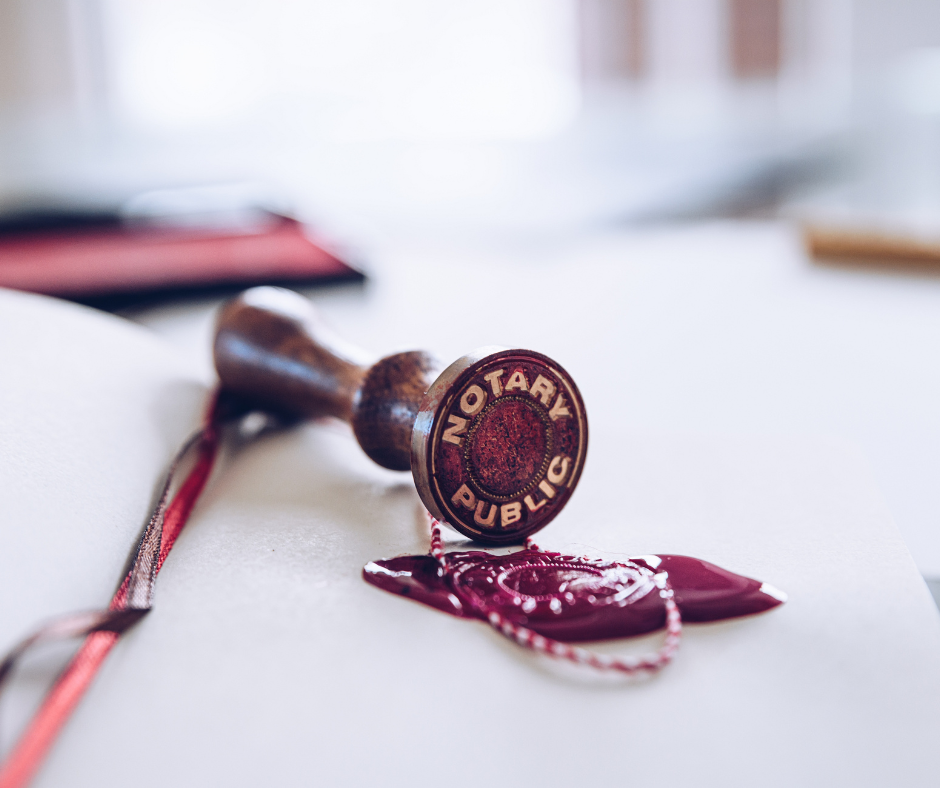
What is a Notary Public?
8th April 2025
Setting ourselves apart from the vast majority of other law firms, we can provide notarial services for you through our qualified Notaries, John Chadaway and Ben James*. We offer Notary services to both individuals & businesses.
A Notary Public is a member of the oldest branch of the legal profession in the United Kingdom and is a qualified lawyer. A Notary Public is appointed by the Faculty Office of the Archbishop of Canterbury and are, like solicitors, subject to rules and regulations.
What is a Notary Public?
A Notary Public is a qualified legal professional who is authorised to perform a range of important tasks related to the certification and witnessing of documents, particularly for use in foreign countries. Notaries in the UK are often involved in verifying the authenticity of documents that are to be used internationally, ensuring that they are legally valid and that the proper procedures have been followed.
Key roles and duties of a Notary Public include:
- Certifying documents: They authenticate documents such as contracts, lasting powers of attorney, property deeds, and company documents.
- Witnessing signatures: A notary witnesses the signing of documents to ensure the individuals are acting voluntarily and with full understanding.
- Administering oaths and affirmations: Notaries can administer oaths for affidavits and statutory declarations.
- Affixing notarial seals: Notaries apply their official seal to documents to confirm their authenticity, which is often required for documents to be accepted internationally.
- Verifying identity: Ensuring the individuals involved are who they say they are by checking their identification.
When might I need a Notary Public?
In the UK, you may need a Notary Public for several reasons, especially when dealing with legal documents that require authentication or certification, particularly for use abroad. Here are some common scenarios where you would need the services of a Notary Public in the UK:
1. International Use of Documents
- If you need to use documents in a foreign country, such as contracts, lasting powers of attorney, affidavits, or deeds, a notary public may be required to verify the authenticity of the documents. Notarised documents are often required by foreign governments or organisations to ensure that the documents are legally valid in their jurisdiction.
2. Property Transactions
- When dealing with property transactions, particularly international real estate, you may need a notary to witness signatures on documents like property deeds, sale agreements, or lasting powers of attorney for handling property matters in another country.
3. Wills and Estate Matters
- If you have a Will or other estate planning documents that need to be used outside the UK or in a jurisdiction that requires notarisation, a notary public can authenticate these documents. This ensures they will be accepted abroad and proves their legitimacy in the legal process.
4. Powers of Attorney
- If you need to give someone the authority to act on your behalf, especially in matters related to business or legal affairs, a notary can authenticate the power of attorney document. This is especially important when the document will be used internationally.
5. Affidavits and Statutory Declarations
- Notaries are needed to administer oaths and verify the authenticity of affidavits or statutory declarations. These documents often require a notary’s confirmation that the information within them is true and has been signed in their presence.
6. Authentication of Documents
- A notary public can authenticate copies of documents to prove they are true and accurate copies of the originals. This might be necessary for documents like passports, birth certificates, or academic records when they need to be used abroad.
7. Business Documents
- If you’re involved in international business, you might need a notary to witness the signing of documents like company formation papers, contracts, shareholder agreements, or minutes of meetings. This can ensure the documents are legally valid in other countries.
8. Preventing Fraud and Ensuring Validity
- Notaries help ensure that the parties signing the documents are doing so willingly and with a clear understanding of the contents. This helps prevent fraud or coercion, especially in important legal matters.
9. International Adoption or Immigration
- If you’re adopting a child from another country or going through an immigration process, a notary may be required to certify documents such as adoption papers, immigration forms, or affidavits for submission to foreign authorities.
10. Legal Requirements for Certain Documents
- Some documents may be legally required to be notarized in the UK to be valid in foreign countries, such as consular forms, international patents, or trademarks.
In summary, you would need a notary public when dealing with official documents that require validation, particularly for use abroad, or when you need a legal professional to certify and witness certain transactions to ensure they’re legally binding and recognised internationally.
What is Legalisation and/or an Apostille?
Legalisation is the method by which a Notary Public’s signature and seal are authenticated by the Foreign and Commonwealth Office and/or relevant Embassy or Consulate so that the work of the Notary Public may be accepted abroad.
A lot of counties require only a single certificate in this respect from the Foreign and Commonwealth Office. This certificate is called an Apostille.
In addition to the Apostille, some counties require that a further certificate is obtained from their own Embassy or Consulate.
Some counties (usually those which are, or have been, part of the British Commonwealth or parts of the United States) do not require any form of legalisation.
*For the avoidance of doubt, please note that John Chadaway’s Notarial Practice is separate from both the solicitors’ practice at BTTJ and Ben James’ Notarial Practice. Likewise, Ben James’ Notarial Practice is separate from both the solicitors’ practice at BTTJ and John Chadaway’s Notarial Practice
If you require notarial services, either as an individual or business, please do not hesitate to contact us
